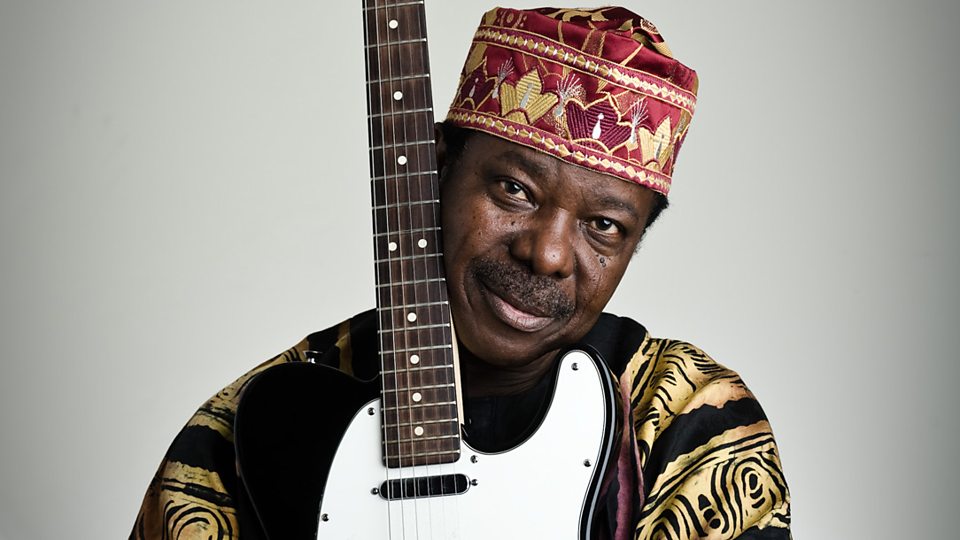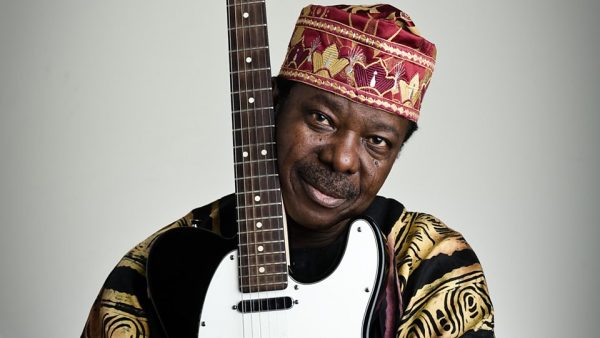If the South Americans can talk about a Carlos Santana, then the West African Region can equally talk proudly about a King Sunny Ade. Born Sunday Adeniyi Adegeye on the 22nd of September 1946, the Nigerian singer-songwriter and multi-instrumentalist in the West African musical style Jùjú is professionally known as,-and must be rightly addressed as, King! King Sunny Ade. Beyond the fact that he is one of the first African pop musicians to attain international success and stardom, as well as, global recognition, he has been regarded as one of the most influential musicians of all time.
Family and Musical Background
Adé was born in Osogbo to a Nigerian royal family from Ondo, thus making him an Omoba of the Yoruba people. His father was a church organist, while his mother was a trader from Akure. Adé left grammar school in Ondo under the pretense of going to the University of Lagos. This was the genesis of his musical career. At the onset, Sunny Adé’s musical career began with Moses Olaiya’s Federal Rhythm Dandies, a highlife band. He eventually left to form a new band referred to as, The Green Spots, in 1967. Subsequently, the name of the Band kept on changing due to various reasons; firstly, they were called African Beats and then eventually, Golden Mercury. Their Music was influenced by Juju pioneer and borrowed stylistic elements from Nightingale’s ‘So wa mbe’ style of juju.
KSA: Improvisation and the Swagger of a Maestro
Sunny Adé introduced the pedal steel guitar to Nigerian pop music. He introduced the use of synthesizers, clavinet, vibraphone, tenor guitar into the jùjú music repertoire such as dub and wah-wah guitar licks. Adé said he used these instruments not as an attempt to innovate, but as a substitute for traditional jùjú instruments which were too difficult to find and/or impractical for touring. The pedal steel guitar, for instance, was added to his repertoire as a sound-alike for an African violin.
Sunny Adé’s music is characterised by a fusion of multiple instruments. Notably amongst them are; the talking drum – an instrument indigenous to his Yoruba roots, the guitar and his peculiar application to jùjú music. His music is in the age-old tradition of singing poetic lyrics (“ewi” in Yoruba) and praise of dignitaries as well components of Juju (traditional African belief) called the Ogede (casting a spell). Hence, Adé’s music constitutes a record of the oral tradition of his people for posterity.
KSA: The Trailblazer
His album, Syncro System (1983), was a very successful one; it earned him his first Grammy Award nomination in the ethnic/traditional folk recording category, hence making him the first Nigerian Grammy award nominee ever. He was also a well regimented artist. In fact, he is quoted as stating that his refusal to allow Island to meddle with his compositions and over-Europeanise and Americanise his music were the reasons why Island then decided to look elsewhere. However, his work at Island record opened up rooms and floodgates for other African artists such as the Senegalese Youssou N’Dour, Mali’s Salif Keita and many others to become globally acclaimed also. King Sunny Ade’s legendary status has also made him a well sought after artist for collaborations by other major artists. Some of these include; Manu Dibango (Wakafrika) and Stevie Wonder (who played harmonica on ‘Aura’), as well as younger Nigerian artists such as Wasiu Alabi Pasuma and Bola Abimbola.
Sunny Ade has also influenced many musicians and notably, is the much loved and celebrated Afro-Jazz musician, Lagbaja. In 2008, his contributions to world music was recognized; as he was given an award for his outstanding contribution to world music at the International Reggae and World Music Awards held at the Apollo Theater in Harlem, New York.
KSA: A Spread of the Tentacles
King Sunny Ade has ventured into; acting, philanthropies, lecturing etc. for example, in the 1980s Adé embarked on a career in Hollywood. He featured in few Nollywood movies in the early 2000s. His music was featured in the 1983 film Breathless, starring Richard Gere, and the 1986 comedy One More Saturday Night, and he acted in Robert Altman’s 1987 comedy O.C. and Stiggs. He founded the King Sunny Ade Foundation, an organization that includes a performing arts center, a state of the art recording studio, and housing for young musicians.
Sunny Adé, now known as ‘The Chairman’ in his home country, was appointed a visiting professor of music at the Obafemi Awolowo University Ile-Ife. In July the same year, King Sunny Adé was inducted into the Afropop Hall of Fame, at the Brooklyn African Festival in the United States. He dedicated the award to the deceased Michael Jackson.
Sunny Ade’s album ‘Odu’ in 1988, which was a collection of traditional Yoruba songs, for which he was nominated for the second Grammy Award, put him in history as the first African to be nominated twice for a Grammy. Apart from being an international musician Sunny Adé is also prominent in his native Nigeria, running multiple companies in several industries, creating a non-profit organisation called the King Sunny Adé Foundation, and working with the Musical Copyright Society of Nigeria. Sunny Adé has received numerous awards during his career. In November 2016 he became a recipient of the AFRIMA award and is also a recipient of the Order of the Federal Republic. In December 2016 he was inducted into Hard Rock Cafe hall of fame.
References
Featured image source: BBC


